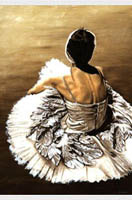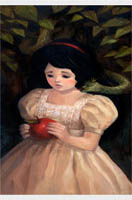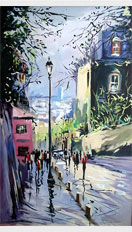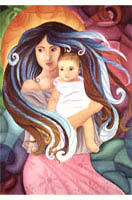Frida Kahlo
Frida Kahlo (July 6, 1907 – July 13, 1954) was a Mexican painter.
Frida KahloKahlo was born Magdalena Carmen Frida Kahlo y Calderon in her parents' house in Coyoacan, which at the time was a small town on the outskirts of Mexico City. Her father was a painter and photographer of German-Jewish background, whose family originated from Oradea, Romania. The young Frida suffered a bout of polio at age six, which left her right leg looking much thinner than the other. Still, with the feisty and brash personality that she kept throughout her life, she overcame her disability.
Kahlo was terribly injured in a severe traffic accident in 1925. Her strong will to live enabled her to survive her injuries and eventually regained her ability to walk, but she would have relapses of extreme pain which would plague her for life. After the accident, Kahlo turned her attention from a medical career to painting. Drawing on her personal experiences, her works are often shocking in their stark portrayal of pain and the harsh lives of women. Fifty-five of her 143 paintings are self-portraits that incorporate personal symbolism complete with graphic anatomical references. She was also influenced by indigenous Mexican culture, aspects of which she portrayed in bright colors, with a mixture of realism and symbolism.
Her paintings attracted the attention of the artist Diego Rivera, whom she later married, divorced, and re-married. The couple's marriage was very unstable and difficult. Rivera was said to have battered Kahlo in fits of rage. When they first married, he was 42, 6 ft 1 in. (1.86 m) tall, and 300 pounds (136 kg); she was 22, 5'3", and 98 pounds. Kahlo once stated, "I suffered two grave accidents in my life. One involved a bus... the other accident is Diego."
An active Communist supporter, Kahlo allegedly had an affair with Leon Trotsky, who was assassinated at his home in Mexico City by agents of Stalin in 1940. Sometime after Trotsky's death, Frida denounced her former friend and praised the Soviet Union under Stalin. She spoke favorably of Mao, calling China "the new socialist hope". Her home was decorated with socialist art, including portraits of Marx, Engels, Stalin, and Mao.
Although Kahlo's work is sometimes classified as surrealist and she did exhibit several times with European surrealists, she disputed the label. Her preoccupation with female themes and the figurative candor with which she expressed them made her something of a feminist cult figure in the last decades of the 20th century.
Kahlo died on July 13, 1954, of a pulmonary embolism. Her ashes are placed in a pre-Columbian urn which is on display in her former home La Casa Azul in Coyoacan, which has been turned into a museum containing a number of her works.
A biographical documentary containing archival footage, entitled Frida Kahlo, was released in 1982, in Germany. In 1984 director Paul Le Duc released the film Frida, naturaleza viva, which stars Ofelia Medina as Frida Kahlo. In 2002, Miramax released a motion picture titled Frida, starring Salma Hayek in the title role.
Kahlo was noted for her unconventional appearance, including pronounced eyebrows (a unibrow) and a thin moustache which she did not remove.







